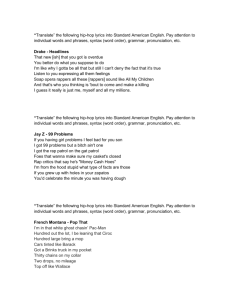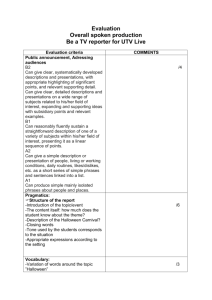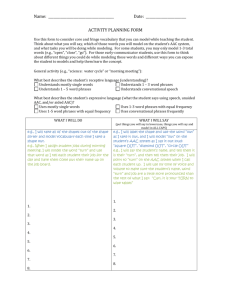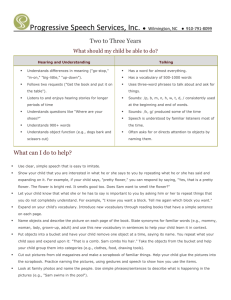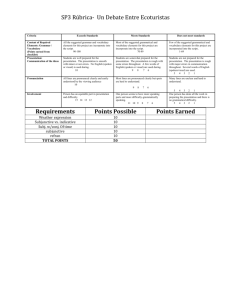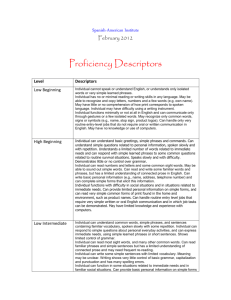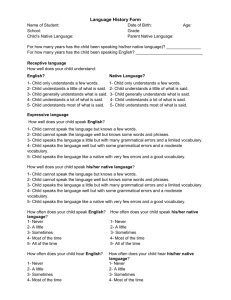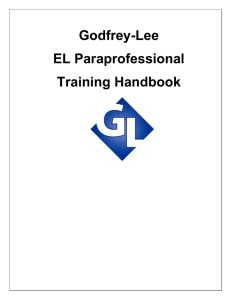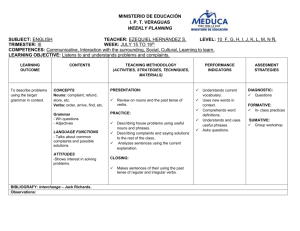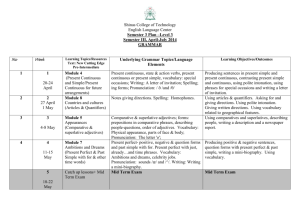iTEP Ability Guide
advertisement
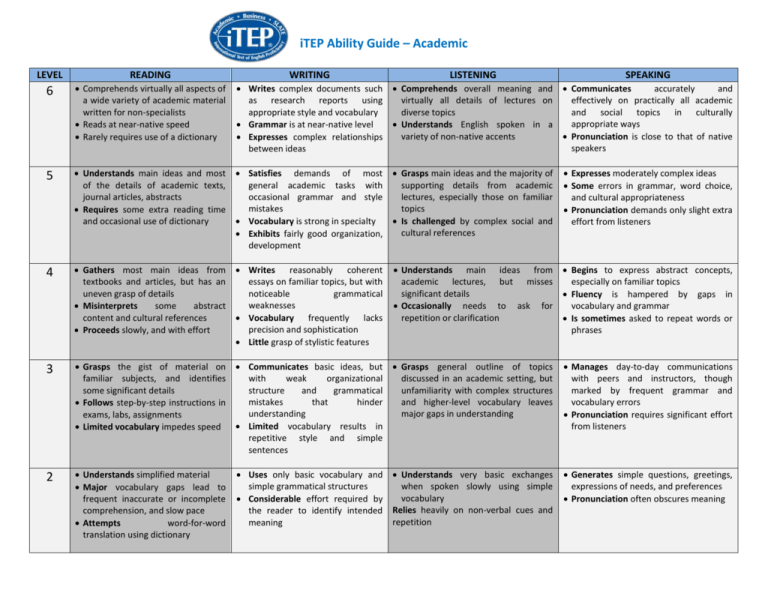
iTEP Ability Guide – Academic LEVEL READING WRITING LISTENING SPEAKING 6 Comprehends virtually all aspects of a wide variety of academic material written for non-specialists Reads at near-native speed Rarely requires use of a dictionary Writes complex documents such as research reports using appropriate style and vocabulary Grammar is at near-native level Expresses complex relationships between ideas Comprehends overall meaning and virtually all details of lectures on diverse topics Understands English spoken in a variety of non-native accents Communicates accurately and effectively on practically all academic and social topics in culturally appropriate ways Pronunciation is close to that of native speakers 5 Understands main ideas and most of the details of academic texts, journal articles, abstracts Requires some extra reading time and occasional use of dictionary Satisfies demands of most general academic tasks with occasional grammar and style mistakes Vocabulary is strong in specialty Exhibits fairly good organization, development Grasps main ideas and the majority of supporting details from academic lectures, especially those on familiar topics Is challenged by complex social and cultural references Expresses moderately complex ideas Some errors in grammar, word choice, and cultural appropriateness Pronunciation demands only slight extra effort from listeners 4 Gathers most main ideas from Writes reasonably coherent textbooks and articles, but has an essays on familiar topics, but with uneven grasp of details noticeable grammatical weaknesses Misinterprets some abstract content and cultural references Vocabulary frequently lacks precision and sophistication Proceeds slowly, and with effort Little grasp of stylistic features Understands main ideas from academic lectures, but misses significant details Occasionally needs to ask for repetition or clarification Begins to express abstract concepts, especially on familiar topics Fluency is hampered by gaps in vocabulary and grammar Is sometimes asked to repeat words or phrases 3 Grasps the gist of material on Communicates basic ideas, but familiar subjects, and identifies with weak organizational some significant details structure and grammatical mistakes that hinder Follows step-by-step instructions in understanding exams, labs, assignments Limited vocabulary results in Limited vocabulary impedes speed repetitive style and simple sentences Grasps general outline of topics discussed in an academic setting, but unfamiliarity with complex structures and higher-level vocabulary leaves major gaps in understanding Manages day-to-day communications with peers and instructors, though marked by frequent grammar and vocabulary errors Pronunciation requires significant effort from listeners 2 Understands simplified material Major vocabulary gaps lead to frequent inaccurate or incomplete comprehension, and slow pace Attempts word-for-word translation using dictionary Understands very basic exchanges when spoken slowly using simple vocabulary Relies heavily on non-verbal cues and repetition Generates simple questions, greetings, expressions of needs, and preferences Pronunciation often obscures meaning Uses only basic vocabulary and simple grammatical structures Considerable effort required by the reader to identify intended meaning 1 0 Comprehends only highly simplified phrases or sentences Recognizes the isolated words alphabet and Writes only short, simple sentences, often characterized by errors that obscure meaning Understands simple greetings, statement, and questions when spoken with extra clarity Communicates with single words, short phrases at “survival” level Intense listener effort required Produces isolated words and phrases Understands a few isolated words or phrases spoken slowly Produces a few, isolated words and phrases Pronunciation mostly unintelligible
